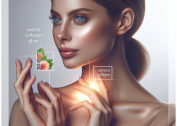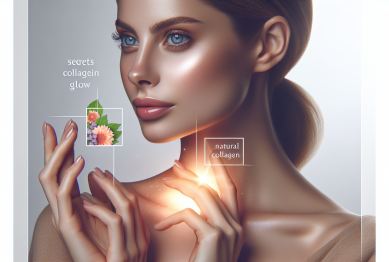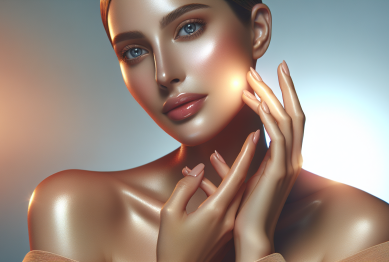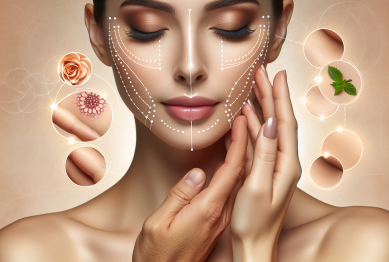Discover the science-backed secrets of collagen for glowing skin, and explore how this natural protein supports wellness and beauty from within. Learn why collagen attracts so much attention, how it’s nourished, and which daily habits can make a real difference.
The Role of Collagen in Skin Health
Collagen, a fundamental protein, forms the structural foundation for healthy skin. Without it, the skin would lack strength and resilience. As people age, natural collagen production declines, leading to common concerns like wrinkles, dryness, and loss of elasticity. It’s no wonder that those pursuing youthful, glowing skin now turn their attention to boosting collagen, which acts as an anchor for moisture and firmness (Source: https://www.ncbi.nlm.nih.gov/pmc/articles/PMC3583892/).
Collagen does more than just impact how skin looks. It helps skin recover from everyday stressors, contributing to overall radiance and bounce. From environmental pollution to hormonal changes, many factors can deplete the collagen matrix beneath the surface. By understanding the core role of this protein, it becomes easier to recognize why nutrition and lifestyle have such a dramatic effect on visible beauty.
Beyond the biology, conversations often focus on how to support natural collagen without relying on extreme measures. Exploring ingredients like vitamin C, hyaluronic acid, and complete proteins—each commonly linked to collagen synthesis—opens new opportunities for preventative care. For many, the journey starts by simply learning which foods and routines keep skin’s collagen network as robust as possible.
Daily Habits That Support Collagen Production
Daily wellness choices can make or break collagen balance in the body. Prioritizing whole foods rich in antioxidants helps shield you from oxidative stress, a known culprit in collagen breakdown (Source: https://www.hsph.harvard.edu/nutritionsource/antioxidants/). Leafy vegetables, berries, and nuts all deliver nutrients which help keep collagen fibers resilient. Even everyday actions like wearing sunscreen can help defend against UV rays, one of the most destructive threats to collagen integrity.
Hydration is another underappreciated habit. Drinking enough water allows the skin to retain suppleness and supports the body’s natural rebuilding processes. Meanwhile, skipping processed sugars is key—excess sugar can disrupt how collagen is formed and lead to premature aging. Consistent, gentle care can offer greater long-term benefits than occasional, intensive treatments by encouraging steady cellular repair.
Finally, regular exercise shouldn’t be overlooked. Physical activity enhances circulation, aiding the delivery of oxygen and nutrients that feed skin cells and collagen-producing fibroblasts. Simple choices—like walking, stretching, or moderate strength training—help support not only beauty goals but overall wellness. These small shifts add up, building the foundation for lasting radiance and skin vitality.
Nutrition’s Impact on Collagen and Beauty
Your plate matters more than many realize when it comes to collagen wellness. Protein sources such as fish, poultry, beans, and eggs supply amino acids, the building blocks of collagen. Vitamin C, found in citrus fruits and bell peppers, is essential for the synthesis process, while nutrients like copper and zinc support structural integrity (Source: https://ods.od.nih.gov/factsheets/VitaminC-Consumer/).
Those exploring plant-based diets also have options. Soy products, chia seeds, and quinoa provide the amino acids necessary for collagen, plus extra antioxidants. It’s this antioxidant action that shields fibroblasts from damage and encourages natural matrix renewal. Strategic nutrition planning can address both immediate beauty results and long-term aging support—all by fueling the right internal chemistry.
Balanced meals support more than skin. Joint health, nail strength, and hair resilience all tie back to the availability of quality collagen. For those seeking a holistic glow, the benefits of an intentional, nutrient-rich diet extend far beyond the mirror. Such an approach transforms beauty routines, emphasizing sustainable habits over fleeting fixes.
Lifestyle Choices That Affect Collagen
Lifestyle shapes the future of skin health in subtle ways. Stress, for example, has been shown to impede the body’s repair abilities and diminish collagen renewal. Chronic stress may interfere with sleep, reduce nutrient absorption, and heighten the release of cortisol, which is linked to tissue breakdown (Source: https://www.apa.org/topics/stress/body).
Quality rest acts as a nightly reset for collagen support. During deep sleep, the body shifts energy to cellular repair, activating processes that foster a plump, refreshed complexion. Data suggest at least seven hours of consistent sleep aids in combating visible aging, while irregular patterns can leave skin looking lackluster. Some people find that establishing a wind-down routine with soft lighting helps unwind from daily tension, creating better conditions for renewal.
Reducing environmental stressors is increasingly important in today’s world. Air pollution, tobacco exposure, and harsh weather can erode collagen reserves over time. Protective strategies, such as gentle cleansing and reinforcing the skin’s barrier with nourishing creams, help control this wear. These steps, though often simple, protect the invisible infrastructure that makes glowing skin possible.
Exploring Advances in Collagen Treatments
Modern innovations are reshaping how people support their natural beauty. Non-invasive therapies, such as microneedling and light treatments, target collagen growth beneath the surface. Evidence now exists for the benefits of certain peptides, measured delivery of topical retinoids, and low-level laser devices—each aiming to stimulate the skin’s natural renewal machinery (Source: https://www.aad.org/public/cosmetic/fillers/collagen).
Collagen supplements, often derived from marine or bovine sources, have become popular for those chasing convenience. Early studies indicate they may promote elasticity and hydration when used alongside a balanced lifestyle, though individual results vary. Choosing reputable supplements, checking ingredient transparency, and consulting with a healthcare provider are recommended for those considering this approach.
Ultimately, no product works in isolation. A holistic approach—combining topical innovation with robust lifestyle choices—can reinforce the skin’s collagen framework more reliably than quick fixes. Staying informed about emerging research empowers individuals to evolve their beauty practices with confidence, resilience, and authenticity.
Debunking Common Collagen Myths
It’s easy to be swept up by marketing hype around collagen and glowing skin. However, no single cream or drink can perform miracles overnight. Many myths persist, such as the belief that collagen creams absorb deeply and instantly change facial structure. In reality, research supports the strongest effects from internal production rather than topical application alone (Source: https://www.mayoclinic.org/healthy-lifestyle/nutrition-and-healthy-eating/expert-answers/collagen-supplements/faq-20420209).
Another myth is that all collagen sources are equal. In truth, the body’s ability to use supplemental collagen depends on how it’s broken down during digestion. Hydrolyzed collagen, for example, may offer more reliable bioavailability compared to unprocessed proteins. Still, results vary widely, and consistency in daily choices matters more than any single product.
Debunking these myths can help set realistic expectations and encourage in-depth learning. Trusted sources and personalized routines support more enduring beauty outcomes than one-size-fits-all solutions. Awareness and education pave the way for more mindful, empowered self-care decisions.
References
1. Baumann, L. (2007). Skin ageing and its treatment. Retrieved from https://www.ncbi.nlm.nih.gov/pmc/articles/PMC3583892/
2. Harvard T.H. Chan School of Public Health. (n.d.). Antioxidants. Retrieved from https://www.hsph.harvard.edu/nutritionsource/antioxidants/
3. Office of Dietary Supplements, NIH. (n.d.). Vitamin C. Retrieved from https://ods.od.nih.gov/factsheets/VitaminC-Consumer/
4. American Psychological Association. (n.d.). Stress effects on the body. Retrieved from https://www.apa.org/topics/stress/body
5. American Academy of Dermatology. (n.d.). Collagen fillers: Overview. Retrieved from https://www.aad.org/public/cosmetic/fillers/collagen
6. Mayo Clinic. (n.d.). Collagen supplements: Do they work? Retrieved from https://www.mayoclinic.org/healthy-lifestyle/nutrition-and-healthy-eating/expert-answers/collagen-supplements/faq-20420209









